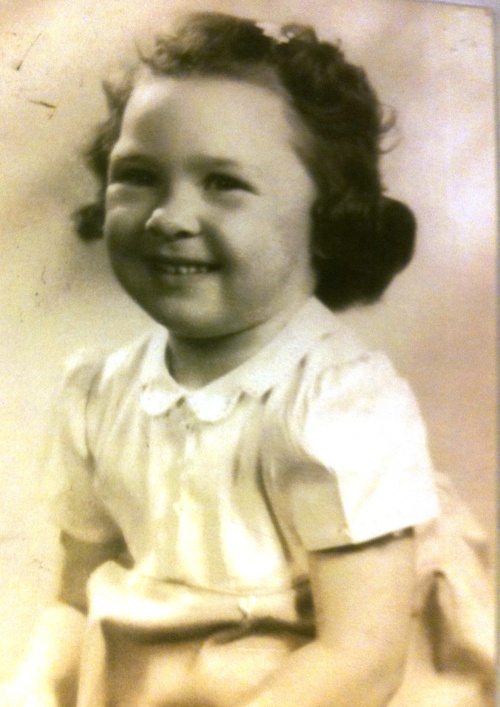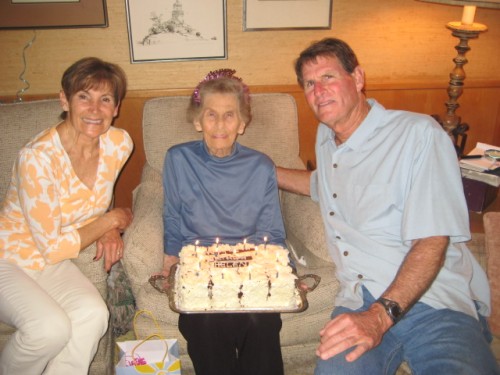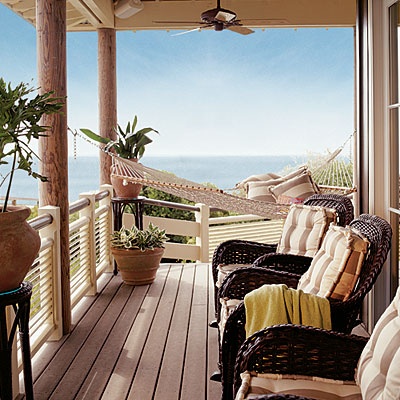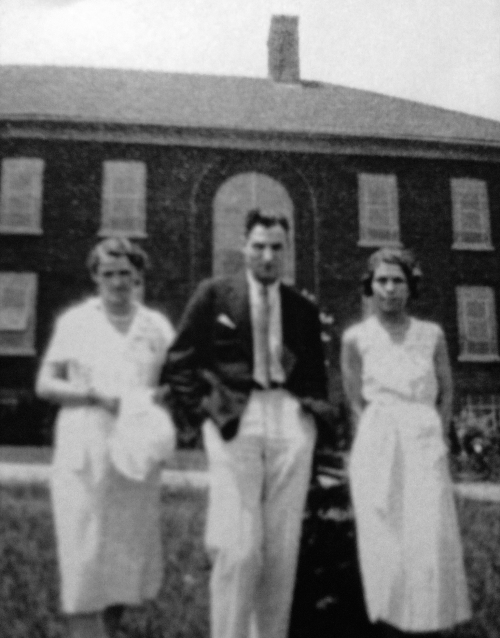My Grandma Helen passed away last month. She was nearly 99. I had the honor of caring for her a few times in her later years, and over the course of those visits she told me about her life. This is the final part of my three-part series on Helen Isobel Norman.
I drove up to Grandma’s house on Arno drive, marveling at how it looked exactly as it did forty-five years ago, with the ivy covered front yard, taupe paint with brown trim, and white iron filigree handrail along the steps to her porch. I pulled into the driveway and opened the garage with an old remote Uncle Steve had given me. Inside the garage was the ‘70s era beige Chrysler, sitting there like always. Uncle Steve had removed the battery to keep Grandma from taking joy rides. I parked, walked into the garage and opened the dryer. Inside were a few towels and wash cloths. I folded them and carried them into the house.
“Hi Grandma,” I called as I stepped into the kitchen. “It’s Cheri.”
I listened for a response.
Silence.
Yikes, I thought. This always makes me nervous.
I quietly walked through the kitchen, took a deep breath, and peeked around the wall into the family room. Grandma was sitting in the chair next to the Davenport, reading the Wall Street Journal.
“Oh hi Honey,” she said, looking up at me. “I didn’t hear you come in.”
I exhaled with relief that she was alive, and gave her a hug. “You look good today, Gram. Hungry? How about some macaroni and cheese?”
“I’m not hungry.”
“I know Grandma.”
I went into the kitchen and opened the freezer that Uncle Steve had stocked before he left for vacation. Inside was a tub of Albertson’s frozen macaroni and cheese. I microwaved it, steamed up some broccoli, and grabbed a big handful of grapes out of the fridge. I assembled the food on a plate and brought it into the family room, along with a glass of Ensure spiked with brandy.
“Oh honey, this is too much!” Grandma protested.
But when I placed a spoonful of macaroni and cheese in front of her lips, she opened them.
“Mmm,” she said, after she swallowed. “You’re a good cook, Cheri.”
“Thanks Grandma,” I smiled. “It’s an easy recipe.”
I looked down to get a forkful of broccoli, but had to do a double-take. Did she just wink at me?
I shifted in my seat and switched the subject.
“So tell me,” I said, while she chewed. “What happened in your life after the orphanage?”
“Well, I got my first job,” she said. “I worked in a dime store, doing bookkeeping. The work was okay, but I often stayed there until midnight finishing the books. And my boss didn’t pay me anything extra.”
“What a drag,” I said.
“Yes. So I quit and got a job at Battelle Memorial Institute, a metallurgical research company connected with Ohio State University,” she said, sitting up proudly. “That was my best job. They gave me vacation and sick leave. And I liked the people; they were very educated.”
“You enjoy being around smart people, who are like you,” I complimented.
“Thank you, honey. I also did a stint as a teacher,” she continued. “But I didn’t care for teaching. In my day, girls weren’t offered much in the way of jobs. You could be a teacher or a nurse, and that was it. Once you got married you weren’t allowed to work anymore. Jobs were scarce and they figured married women didn’t need them as badly as everyone else. So I would lie and say I was single. I got away with that for a while. Until I got pregnant.
We laughed. “It’s a good thing times have changed,” I said. “Women have more choices now.”
Grandma nodded. I put another spoonful of macaroni in front of her mouth, which she opened without hesitating.
Guess she was hungry after all.
“How did you like being pregnant?” I asked.
“I was sick throughout all three pregnancies,” she said. “I couldn’t keep anything down. I weighed only 93 pounds. Being pregnant was the only time in my life I was thin, other than now.”
I looked at Grandma’s frail, bony body, so different from how I remembered it growing up. She was no waif then. She was five foot two, but had a big bosom and midriff. To me, she had always been soft and cushy, and I loved her warm hugs.
“I tried every diet out there. Weight Watchers, Atkins, Slimfast,” she said. “Sometimes all I ate were grapefruits and hard-boiled eggs. Nothing worked, at least for long. But now being thin does me no good. I just wear these robes all day and everyone’s always trying to get me to eat!”
Ironic, I thought. Like Grandma, I also struggled to control my weight. But now I wondered if it was worth the trouble. I had never given Grandma’s weight a second thought. I always liked how she looked. Perhaps I needed to keep things in perspective, make peace with my large frame, and be thankful I was healthy.
Grandma’s voice interrupted my thoughts. “Luckily the pregnancy health costs were not a problem,” she said. “Carol and James were both born in a Ohio State “teaching” hospital. Clyde was a medical student there, and med students didn’t have to pay for care.”

Carol Gay in 1939, at age three. Helen sent this picture to a children’s beauty pageant
“What was it like raising your kids?” I asked.
“Well, your mom and Jimmy were pretty easy,” she said. “But Steve was another matter.”
“Really?” I laughed. But then I thought of my outgoing and talkative uncle. “Actually, I’m not surprised to hear that.”
“Steve was born in 1947. Right afterwards Clyde got a Navy transfer to Guam. Carol and Jimmy were ten and four years old. What I remember most was Steve being terrible on that international flight to Guam. All the Navy people were ready to throw him off the plane!” Grandma rolled her eyes.

Carol, Jimmy, and Steve, 1947.

Carol, Jimmy and Steve, 1956.
“But even if it wasn’t always easy raising them, I was proud of my kids. Carol went to school after college and became a nurse, which wasn’t easy for her because she met and married your dad when she was young, just 22. She was still going to school when she was pregnant with you.”
“That’s neat she was a nurse.”
“Yes. She had a warm way about her. Like you, honey.”
“Thanks Grandma.”
“And Jimmy was a really good swimmer. He started swimming at a public pool when we lived in Hawaii. The guy in charge thought he was a better swimmer than the other kids, and offered to coach him. After that I spent half my life carpooling Jimmy to swim meets. But his hard work earned him a spot in the Olympic Trials. He never made it to the Olympics, but the Trials were a good experience for him.”
“I bet he could have made it to the Olympics,” I said. “He died when he was just 20, right?” I asked.
“Yes.”
“Tell me about that, Grandma.”
Grandma didn’t even pause. She must have needed to talk about it.
“It was 1962, and Jimmy was at the University of Cincinnati where he’d gotten an academic scholarship. In March he was on the front page of the Cincinnati Sunday Tribune, for an article about the swim team. Three weeks later, on his Spring Break, he drove with a buddy, Jim Marchetti, to California to visit friends and family. He and his friend drove thousands of miles in a Renault, a small European car with the engine in the back. Marchetti was driving toward San Diego on a two lane highway when he fell asleep at the wheel. Their car hit another car, head-on.”
“Oh Grandma, how tragic.”
“Yes, both boys were killed.”

Jimmy Norman
“What happened to the person in the car they hit?”
“It was a Cadillac, being driven by a middle-aged woman. I’m not sure what happened to her, but she was not killed, I know that.”
I was just one and a half, I thought. My mother was pregnant with Laurie. Gosh, that must have been so tough, I thought. I had heard I was not an easy baby and cried a lot. My mother was 25 and had to deal with me, her crazy pregnancy hormones, and then the senseless and sudden death of her beloved younger brother.
“It was really sad because he had such a bright future,” Grandma said, with tears in her eyes. “Your mother and Jimmy were very close. They wrote each other all the time.”
“His death triggered her depression, right?”
Grandma looked at me, a forlorn look in her eyes. “Probably, Cheri.”
“Did you ever talk to her about her that?”
“Yes. I was very concerned about her. One day she came over to talk.
Grandma paused. I grabbed her hand and squeezed it.
“I know this is a difficult subject, Grandma.” I said softly. My heart was racing, and I was feeling shaky, but holding Grandma’s hand calmed me down. I needed to hear what she had to say. “Tell me more.”
“I asked Carol to describe her depression, because I didn’t understand it. She said she felt she was in a dark hole, and there was no way out.”
I envisioned my mother, trapped in a deep cave, with no light, feeling lost and lonely and hopeless.
“She went to several psychologists, but they couldn’t help her,” Grandma continued. “She suffered with depression for five years.”
“I wish she’d tried harder to find the right psychologist,” I said. “I’m sure there were some good ones, even in the sixties. And I wish they’d had good antidepressants back then. I believe if she’d been born a few years later and gotten the right help and medication, that she’d still be here today.”
“You’re probably right, Cheri.”
We sat for a moment, our hands clasped, in silence.
“Do you know where she’s laid to rest now?” I asked.
“No.”
“Hmm.” Interesting, I thought. Why doesn’t Gram know this? I know she went to the funeral.
But before I could question her, Grandma changed the subject.
“Clyde and Jimmy are buried at Fort Rosecrans National Cemetery, in Point Loma,” she said.
“I remember when Grandpa Clyde passed away. It was 1972 and I was in the seventh grade. I’ll never forget the beautiful grave site on that cliff, and the 21 gun salute they gave him. All those men in uniform, and the guns going off. Scared me kind of, but I was proud too.”
“Yes, Clyde was a Captain in the Navy, and a war hero. He was on the USS Bennington during a fire explosion in 1954, the only doctor to survive. He recruited a bunch of sailors on the spot to help with first aid. Over a hundred men died in that explosion, and over 200 were injured. It was the worst Navy disaster since Pearl Harbor.”

“Wow, Grandma. And to think he met you in the orphanage. You both came such a long way.”
“We just made the best of things, Cheri. Jimmy, Carol and Clyde are gone now, but I’m grateful I have Steve,” she said. “He amazes me. When he was 11 or 12 he was awful, always getting into trouble. I was forever running to the principal’s office. But he became a really good person, and he and Susan take very good care of me.”

Steve and Susan with Helen, on her 96th birthday last year, March 11, 2009
“And now I have four grandchildren and 12 great-grandchildren.”

Helen’s sister Pauline, granddaughter Laurie, granddaughter Cheri (me) and Helen in 2006

Bee Gibbs and Helen Norman with four of their great-grandchildren, December, 1993
One Thing to Remember About Helen
“Grandma, is there anything you want people to remember about you?” I asked.
“Cheri, I did nothing special. I’m just an ordinary person. I had no big accomplishments, other than my full academic scholarship to Wittenberg.”
“Well I’m impressed at how you handled difficult situations, Grandma. You lost your mom as a girl and got sent to an orphanage, but you turned your life around. You met Grandpa Clyde and got a college scholarship. And when you became a parent and lost two children, you never seemed to feel sorry for yourself. You picked yourself up, and went on with life. That is inspiring!”
“Well Cheri honey, we just made the best of our situation.” she said.
We nodded and smiled at each other. I lifted up the glass of Ensure with Brandy, and Grandma pulled the straw to her lips. She took a long sip.
***
Grandma passed away on February 17, 2012, peacefully in her home. We had a lovely memorial ceremony for her on March 9th, and we were able to reunite Helen with her daughter Carrie at Fort Rosecrans National Cemetery, in Point Loma, San Diego, California. They are in a grave site shared with Helen’s husband Clyde and son Jimmy, overlooking the Pacific Ocean. And some days, when the wind and tide is just right, you can hear the waves crashing below.
Grandma Helen was a special, wonderful woman. She will be dearly missed.
Helen Isobel Norman
March 11, 1913 – February 17, 2012



















